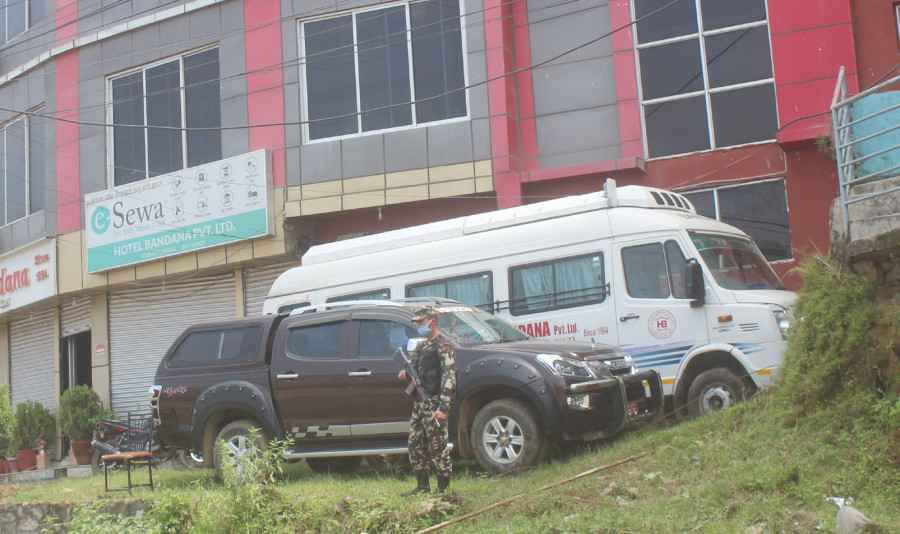National
Local units in Gandaki are running out of financial resources to combat coronavirus
As the province sees a surge in Covid-19 cases, local units struggle to fund their response, including rescue efforts.
Gandaki Province Bureau
Until three weeks ago, most of the quarantine facilities in Gandaki Province were virtually empty. The province had reported only two cases of coronavirus, one in early April and the other in late May, and both the patients have recovered and been sent home. While its neighbouring provinces continued to see a surge in coronavirus cases, Gandaki did not report any new cases until two weeks ago.
However, in the last two weeks, the province has seen a sudden spike in the number of coronavirus cases due to the massive influx of returnees. The province’s quarantine facilities, which remained unused for about two months since their establishment, are now crowded with recent returnees from outside the province and India.
The provincial government had instructed all local units to set up quarantine facilities to house returnees. But the sheer number of people who need to be quarantined has overwhelmed the local units and their administrations, with some local units running out of financial resources set aside for the coronavirus crisis.
Padampani Sharma, mayor of Phalebas Municipality in Parbat, says all quarantine facilities in the local unit are filled to their capacity so his office has decided to keep new returnees at the facilities in Kushma, the district headquarters.
“We have turned almost all community schools and public buildings into quarantine facilities in Phalebas. They are full and we don’t have the resources to build new ones. We will have to quarantine those returning to Phalebas in Kushma,” he said. “But we will bear their expenses.”
Sixty Phalebas natives have returned to Parbat from India in the past two weeks.
“We have 100 more coming soon. Our administration has kept 60 people in various hotels in Kushma and the per head cost of each person is about Rs 1,750 daily,” said Sharma. “So the municipality is already spending more than Rs 100,000 every day on quarantining people. And we are already running out of funds.”
According to Sharma, Phalebas Municipality has allocated Rs 6 million in the municipal corona control fund. “We have already spent Rs 4 million on setting up quarantine facilities and quarantining people elsewhere. We also spent some of that amount in the treatment of five Covid-19 patients,” said Sharma.
In Kushma Municipality, the local unit has already spent more than half the amount it set aside for the coronavirus crisis but it is nowhere close to accommodating all the returnees. “We had prepared a fund of Rs 8 million to control the spread of coronavirus and provide reliefs to the affected people. We have already spent Rs 6.5 million in building and managing five quarantine facilities with around 200 beds,” said Ramchandra Joshi, the mayor of Kushma. “We currently have 150 people across all quarantine facilities in Kushma; we have 150 more coming on Friday. We may have to use the development budget to set up more quarantine facilities,”
For a lack of financial and logistical support from the federal and the provincial governments, most local units in Parbat have been unable to set up more quarantine facilities while meeting the standard stipulated by the federal government.
Parbat has so far reported nine coronavirus cases while the total tally for the province has reached 75 as of Saturday.
In Baglung, quarantine facilities with a cumulative capacity of 400 beds have been set up across all local units. Until May 22, a majority of these facilities were vacant. However, in the past two weeks, the district saw a large number of returnees, prompting the local unit to build more quarantine facilities. According to the district administration office, there are four times more quarantine facilities in the district now than two weeks ago and all of them are full.
“There are around 200 people in 13 different quarantine facilities in our municipality. We have spent Rs 700,000 on food alone for those in quarantine in the last two weeks,” said Bharat Sharma Gaire, the mayor of Galkot Municipality. According to him, the local unit is running on a tight budget and will not be able to support more people in quarantine.
In Palungtar Municipality in Gorkha, there are around 50 people quarantined in various facilities.
“The municipality so far has been providing food and other essentials to those in quarantine, but if the number of returnees keeps increasing, we might have to look at other options,” said Dipendra Giri, an officer at the health unit of the municipality. “More people from India will be returning to the municipality in the coming days.”
Myagdi’s local units have spent over a cumulative of Rs21million in response to the Covid-19 crisis. Beni Municipality alone has allocated nearly Rs11million to prevent the spread of Covid-19; of the allocated amount, over 6.5million has been spent so far. A large proportion of the amount has gone into setting up quarantine centres and maintaining isolation wards, according to municipality officials. Recently, rescue efforts for returnees from India have taken up a significant amount as well, Ratna KC, accounting officer at Beni Municipality, said.
Chief District Officer Gyannath Dhakal said as local units are struggling to fund their Covid-19 response, they are depending on funds received from donors, such as the District Crisis Fund.
But the funds haven’t been proportionately distributed and local units, such as Mangala Rural Municipality, are struggling to combat the disease, according to Krishna Gautam, chief administrative officer of Mangala.
“The expenses keep on rising and are likely to rise some more in the days to come,” said Gautam. “We will have no option than to channel the development budget to crisis management.”
(Agandhar Tiwari reported from Parbat, Prakash Baral from Baglung, Hariram Uprety from Gorkha, and Ghanashyam Khadka from Myagdi.)




 9.7°C Kathmandu
9.7°C Kathmandu














